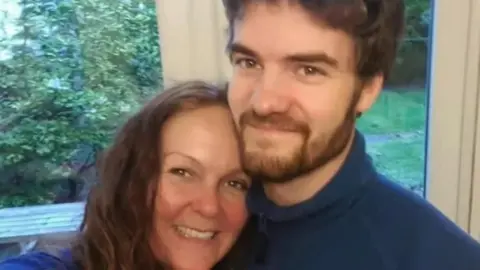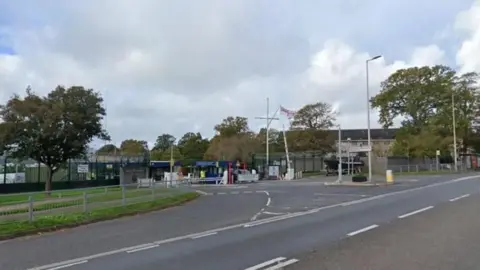Marine recruit who lost equipment killed himself
 Family handout
Family handout The loss of a piece of equipment by a Royal Marine recruit led him to take his own life on a railway line, an inquest concluded.
Senior coroner Philip Spinney criticised failures in Connor Clark's mental health care, after the 18-year-old from Norwich was found dead on the tracks next to the Commando Training Centre in Devon on 12 June 2021.
The teenager had commented prior to his death about being called a "failure" and the "worst recruit", for misplacing the blank firing adapter for his weapon.
Mr Spinney said Mr Clark had died from multiple severe injuries as he recorded a conclusion of suicide.
The coroner for Devon, Plymouth & Torbay said there was evidence Mr Clark had been looking for the piece of equipment ahead of an inspection due on the day he died.
He said: "I conclude that Connor losing his blank firing attachment probably contributed more than minimally to the cause of his death."
The teenager was three weeks into a four-week recruit orientation phase course at Lympstone that Marines take before their initial training.
The inquest has heard he had "struggled" with organising his personal kit and had failed inspections.
 Google
GoogleThe inquest in Exeter heard fellow recruits describe a "hostile atmosphere" between them and instructors who would shout and swear and hand out group thrashings for collective mistakes.
Fellow recruits said he had suffered more "thrashings" - a type of physical punishment like running or press ups - than anyone else.
The officer in charge, Major Mark Thrift, denied he had called Mr Clark the "worst recruit", but accepted he told him he was failing the course.
Able Seaman Chris Lee, who was on the same course, rejected claims the teenager had been a target of bullying by instructors.
"I wouldn't say he was singled out or targeted any more than the rest of the troop," he said.
Two days before Mr Clark died, he had gone to the sick bay for treatment for a wound to his elbow.
The inquest heard he had self-harmed by using a knife to reopen the wound.
Response 'inadequate'
An internal review concluded Mr Clark should have received a mental health assessment.
"It is clear that I did not adhere to the guidance and thus made a poor and a wrong decision in not seeking a case conference," said Surgeon Commander Jon Bedford, an experienced locum.
In his conclusion, Mr Spinney said: "Connor was finding some aspects of the course difficult.
"Connor's own perception of his performance on the course probably, or more than minimally, contributed to his death.
"Connor losing his blank firing attachment probably contributed more than minimally to his death.
"The response by the Commando Training Centre to the information that Connor had gone missing from the camp was inadequate. It cannot be said this made any contribution to Connor's death."
